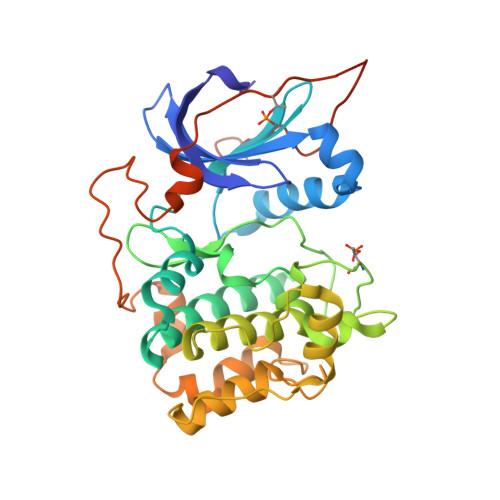Identification of 4-(2-(4-amino-1,2,5-oxadiazol-3-yl)-1-ethyl-7-{[(3S)-3-piperidinylmethyl]oxy}-1H-imidazo[4,5-c]pyridin-4-yl)-2-methyl-3-butyn-2-ol (GSK690693), a novel inhibitor of AKT kinase.
Heerding, D.A., Rhodes, N., Leber, J.D., Clark, T.J., Keenan, R.M., Lafrance, L.V., Li, M., Safonov, I.G., Takata, D.T., Venslavsky, J.W., Yamashita, D.S., Choudhry, A.E., Copeland, R.A., Lai, Z., Schaber, M.D., Tummino, P.J., Strum, S.L., Wood, E.R., Duckett, D.R., Eberwein, D., Knick, V.B., Lansing, T.J., McConnell, R.T., Zhang, S., Minthorn, E.A., Concha, N.O., Warren, G.L., Kumar, R.(2008) J Med Chem 51: 5663-5679
- PubMed: 18800763
- DOI: https://doi.org/10.1021/jm8004527
- Primary Citation of Related Structures:
3D0E - PubMed Abstract:
Overexpression of AKT has an antiapoptotic effect in many cell types, and expression of dominant negative AKT blocks the ability of a variety of growth factors to promote survival. Therefore, inhibitors of AKT kinase activity might be useful as monotherapy for the treatment of tumors with activated AKT. Herein, we describe our lead optimization studies culminating in the discovery of compound 3g (GSK690693). Compound 3g is a novel ATP competitive, pan-AKT kinase inhibitor with IC 50 values of 2, 13, and 9 nM against AKT1, 2, and 3, respectively. An X-ray cocrystal structure was solved with 3g and the kinase domain of AKT2, confirming that 3g bound in the ATP binding pocket. Compound 3g potently inhibits intracellular AKT activity as measured by the inhibition of the phosphorylation levels of GSK3beta. Intraperitoneal administration of 3g in immunocompromised mice results in the inhibition of GSK3beta phosphorylation and tumor growth in human breast carcinoma (BT474) xenografts.
- Oncology Center of Excellence for Drug Discovery, GlaxoSmithKline, 1250 South Collegeville Road, Collegeville, Pennsylvania 19426, USA. dirk.a.heerding@gsk.com
Organizational Affiliation:


















